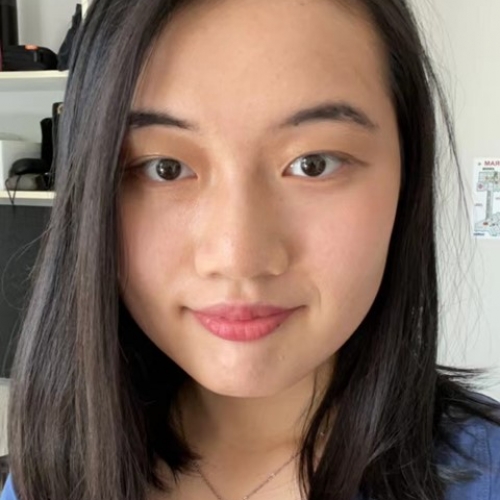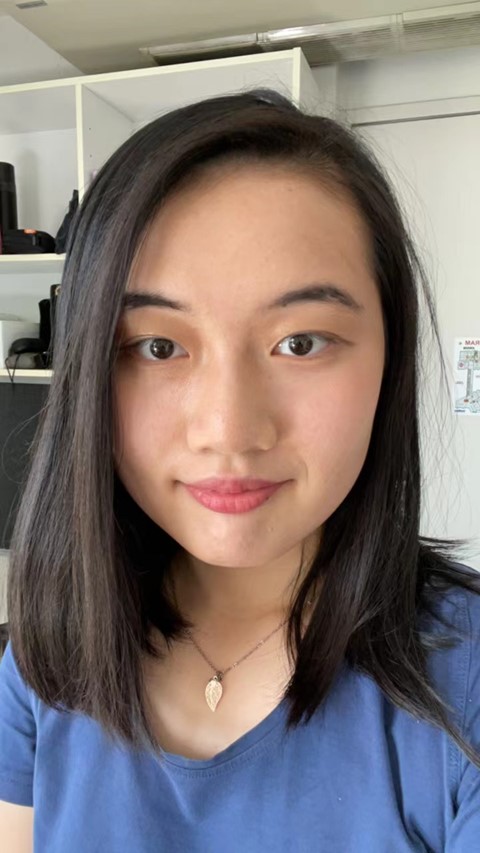
Yuchen Jiang
Australian National University
Yuchen began her journey of studying overseas in October 2017. First time going abroad alone, she laid her eyes on the quiet and peaceful city of Adelaide. Since she skipped year 12, to be qualified for the University of Adelaide, she was required to attend Foundation Studies. During that time, she was fortunate to get to know a remarkable mathematician, who guided and encouraged her towards a pursuit of mathematics. After Foundation, she went on and did a Bachelor of Mathematical Sciences (Advanced) at the University of Adelaide without hesitance. Majoring in pure math and statistics, she participated in many projects and competitions in various fields and was further exposed to the beauty of mathematics. She was constantly amazed by the power of math and decided to come to ANU for a Master of Advanced Mathematical Sciences after her bachelor’s degree. The new environment and the opportunity to work with top researchers excite her, and she is looking forward to the challenges ahead. On the side, Yuchen also does tertiary level tutoring. She enjoys explaining concepts and helping her students understand the principles behind workings rather than simply apply results. Her current goal is to work towards a PhD in mathematics.
Can you give me a quick overview of the type of mathematics you are studying and its potential impacts for the broader community?
My current research interest lies in topological data analysis. It is based on a mathematical theory called persistent homology, which can be used to construct and verify features of imagery data. My project will focus on biometrics, but the technique can be used in a variety of settings. For instance, archaeologists can use it to identify different type of bones, and botanists can use it to identify features of leaves. The beauty of this project is that it is very much a pure math project and explores theories behind the method, but it is motivated by real-life applications.
How did you get into mathematics/statistics/data science? Was there someone or something that inspired you to this field?
I was fortunate to have met many great math teachers and researchers along the way, who guided and encouraged me to keep digging deeper in mathematics. The supportive environment gives me a strong sense of community, which firms my determinations to continue down this path.
You received a scholarship to attend AMSI Summer School 2022. How important was this in terms of your ability to attend, fully participate in the program and meet others studying in similar fields?
As an international student, on top of paying high tuition fee, I could hardly imagine doing more math courses outside of standard uni curriculum. Especially during the recent outbreak, the scholarship opportunity was a lifesaver. Being able to learn from top researchers with like-minded people was not just an escape from the upsetting reality, but an amazing experience on its own.
The purpose of Summer School is to give students an opportunity to develop their mathematical skills, meet like-minded people and network with potential employers. What was the most valuable part of the program for you? Was it the course content or the people you met? Do you have new ideas for your work/research or see it in a new light?
I enjoyed all parts of the summer school – from the interesting discussions at the opening ceremony to inspiring student talks and public lectures. I especially loved Professor Kate Smith-Miles’ public lecture on the unexpected beauty of self-evolving mathematical functions. The intersection of science and art fascinates me. It not only proved that artistic perspectives are a personal thing, but also showcased a new probability for an interdisciplinary collaboration.
Summer School included a special Careers Day program which aims to help give students an idea of the kinds of career paths available to maths graduates in industry and private sector research areas. Were you previously aware of the types of industry opportunities available to mathematical science graduates? Would you consider working with industry? Do you feel better equipped to explore career options in the mathematical sciences after attending AMSI Summer School?
Prior to last year’s summer school (which I also attended), I was not aware of and have never been to career events of similar types. Most career events I went to seemed to be catered for engineering or computer science students. While many believe that most industries are open to math graduates, I personally find it hard to find opportunities tailored for math students. AMSI Careers Day program and the lunchtime lecture with Optiver this year certainly gave me more confidence in finding math-driven work opportunities, and I will definitely consider working with industries in the future.
AMSI Summer School was held as a virtual event. What was the biggest positive from your point of view holding it in this format and/or the biggest challenge?
Virtual events provide more flexibility. During the summer school, I was unfortunately sick for a while, and I had to move between states after I got better. So having everything online made it easier to keep up with courses and events. That said, online environment does make communication and interactions with other students slightly harder. But thanks to GatherTown and Zoom chat functions, etc., I still get to meet new people, which was always an enjoyable experience.
What advice would you give to someone who is considering applying for Summer School in 2022? Should they apply and why?
I would say definitely check out the pre-quizzes and descriptions for the courses on the website. Every year AMSI summer school offers such diverse range of topics, and there will definitely be something that you find interesting. While the course can be intensive due to its compact nature, the chance to get exposed to something new and interesting is not something you want to miss. On top of that, the program extras connected people at different levels in the mathematical community, which is a mind-blowing experience.
Where do you want the mathematical sciences to take you? Where do you see yourself in five, ten years’ time?
I enjoy doing the theoretical part of mathematics, but I’d also like to know that the math that I do can have some application and bring a positive impact to the society. I want to do more mathematical research in fields that stand at the intersection of applied and pure math.
Any other feedback/comments you would like to provide on the AMSI Scholarship or AMSI Summer School 2023?
As travel restrictions ease, it would be good if AMSI Summer School 2022 is of a hybrid mode that caters for both people within and outside of Australia

